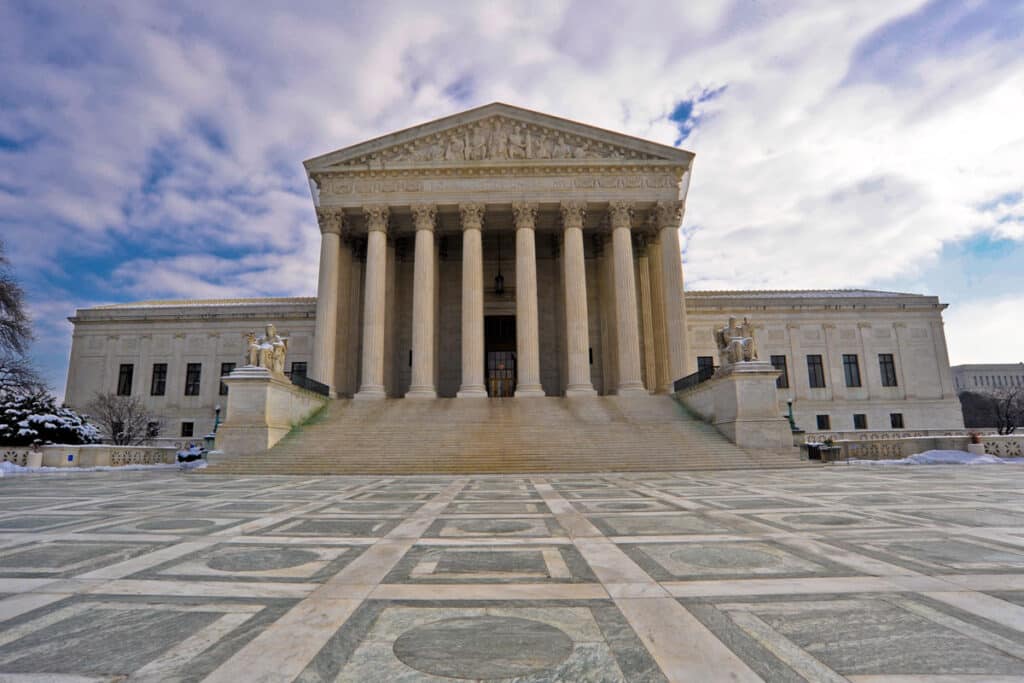
Supreme Court rulings overview:
- Who: The U.S. Supreme Court made several decisions in the leadup to its annual summer recess.
- Why: The high court’s decisions addressed federal student loan forgiveness, whether a state has the ability to set its own rules for federal elections and if an obstruction of justice charge can result in immediate deportation, among other things.
- Where: The Supreme Court rulings affect individuals nationwide.
The U.S. Supreme Court made a number of rulings in the leadup to the high court’s annual summer recess.
The decisions involved federal student loan forgiveness, a Christian website designer’s refusal to provide her services for same-sex weddings and whether a state can set its own rules for federal elections, among other things.
The Supreme Court typically recesses each year beginning in late June to early July before returning to the bench the first Monday of October.
Biden admin not allowed to forgive federal student loans, high court says
The Supreme Court determined late last month President Joe Biden’s administration is not allowed to forgive federal student loans, ruling the federal government overreached with its student loan forgiveness plan.
Biden’s student loan forgiveness plan would have canceled $10,000 in outstanding student loan debt for individuals making under $125,000 per year. The plan would also have forgiven $20,000 for Pell Grant recipients.
The Biden administration had asked the high court to overrule a decision by two lower courts that blocked its federal student loan forgiveness plan.
Supreme Court rules Christian website designer does not need to provide same-sex weddings services
The high court voted 6-3 last month in favor of Christian website designer Lorie Smith, who argued that, as an artist, she could not be forced to provide her services to LGBTQ+ couples requesting a website for their same-sex wedding.
The justices, who voted along ideological lines, ruled Smith’s free speech would be violated if she were exposed to legal liability under the state’s anti-discrimination law.
“In this case, Colorado seeks to force an individual to speak in ways that align with its views but defy her conscience about a matter of major significance,” Justice Neil Gorsuch says in the Supreme Court’s opinion, writing for the majority.
Constitution’s election clause does not allow state lawmakers to set own rules for federal elections, Supreme Court says
The Supreme Court determined in June that the elections clause of the Constitution does not give state lawmakers the ability to set their own rules for federal elections.
The high court’s decision, which came in a 6-3 vote, stemmed from a North Carolina case that involved a challenge to redrawing district maps.
“When state legislatures prescribe the rules concerning federal elections, they remain subject to the ordinary exercise of state judicial review,” Chief Justice John Roberts writes for the majority.
Supreme Court rules individuals can file suit against companies in state they are registered to do business in
The Supreme Court ruled last month individuals can file a lawsuit against a company in the state it is registered to do business in, overruling a lower court’s decision that Norfolk Southern could not be sued in Pennsylvania.
Justices determined a precedent had been set from a previous Pennsylvania Fire ruling, which the high court says holds that “suits premised on these grounds do not deny a defendant due process of law.”
“It is enough to acknowledge that the state law and facts before the Court fall squarely within Pennsylvania Fire’s rule,” the Supreme Court ruling states.
High court rules obstruction-of-justice crimes can result in immediate deportation
The Supreme Court voted 6-3 last month that crimes involving obstruction of justice can result in immediate deportation, ruling Section 101 of the Immigration and Nationality Act does not require the charge to interfere with a legal process or ongoing investigation.
“Individuals can obstruct the process of justice even when an investigation or proceeding is not pending,” Justice Brett Kavanaugh writes for the majority.
The decision resolved a split decision from a circuit court over whether an immigrant can be deported for the crime of obstruction of justice.
Supreme Court grants writ of certiorari to petitioners challenging repatriation tax
The high court granted a writ of certiorari late last month to a pair of petitioners challenging a repatriation tax from the U.S. government.
The petitioners challenge whether earnings gained from a foreign investment that were not realized but instead reinvested should be subject to a repatriation tax, which was first introduced as part of the Tax Cut and Jobs Act of 2017.
What do you think of the recent Supreme Court decisions? Let us know in the comments.
Don’t Miss Out!
Check out our list of Class Action Lawsuits and Class Action Settlements you may qualify to join!
Read About More Class Action Lawsuits & Class Action Settlements:















One thought on Supreme Court makes several rulings before summer recess
Add me please